汉语疑难句法翻译
- 格式:doc
- 大小:31.00 KB
- 文档页数:3
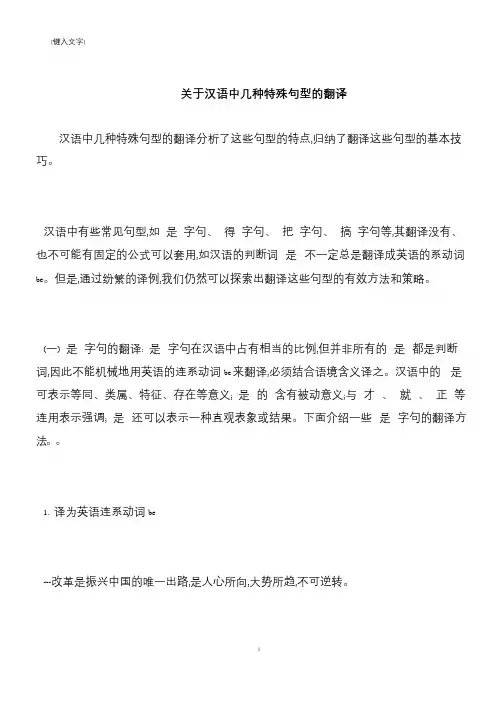
关于汉语中几种特殊句型的翻译汉语中几种特殊句型的翻译分析了这些句型的特点,归纳了翻译这些句型的基本技巧。
汉语中有些常见句型,如是字句、得字句、把字句、搞字句等,其翻译没有、也不可能有固定的公式可以套用,如汉语的判断词是不一定总是翻译成英语的系动词be。
但是,通过纷繁的译例,我们仍然可以探索出翻译这些句型的有效方法和策略。
(一) 是字句的翻译: 是字句在汉语中占有相当的比例,但并非所有的是都是判断词,因此不能机械地用英语的连系动词be 来翻译,必须结合语境含义译之。
汉语中的是可表示等同、类属、特征、存在等意义; 是的含有被动意义;与才、就、正等连用表示强调; 是还可以表示一种直观表象或结果。
下面介绍一些是字句的翻译方法。
1. 译为英语连系动词be---改革是振兴中国的唯一出路,是人心所向,大势所趋,不可逆转。
Reform is the only process through which China can be revitalized, a process which isirreversible and which accords with the will of the people and the general trend of events. ---那年月,有钱人是天天过年。
In those years, the rich people s extravagance was such that everyday was a SpringFestival.---是党和政府的正确方针和政策,促进了广大农村的经济繁荣。
It is the correct principles and policies of our Party and Government that have promoted theeconomic prosperity of China s vast rural areas.2. 省略是字---武汉是长江中下游地区的特大城市,是湖北省的政治、经济、文化、科技中心。
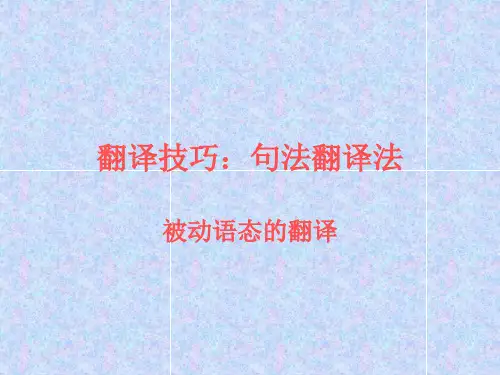
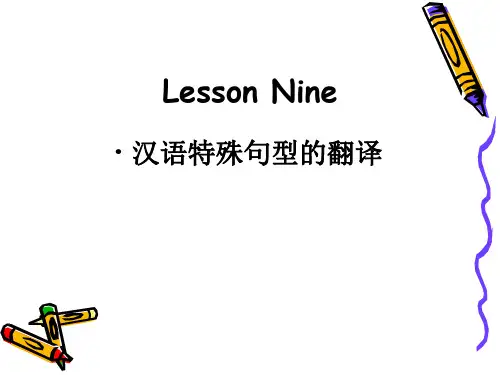
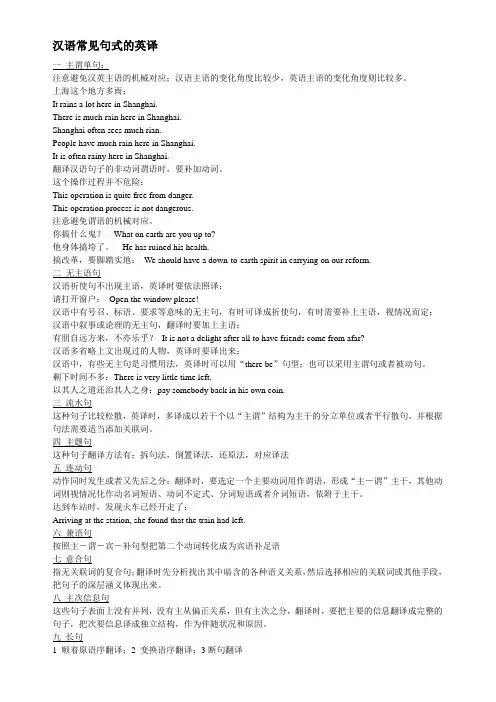
汉语常见句式的英译一主谓单句:注意避免汉英主语的机械对应;汉语主语的变化角度比较少,英语主语的变化角度则比较多。
上海这个地方多雨:It rains a lot here in Shanghai.There is much rain here in Shanghai.Shanghai often sees much rian.People have much rain here in Shanghai.It is often rainy here in Shanghai.翻译汉语句子的非动词谓语时,要补加动词。
这个操作过程并不危险:This operation is quite free from danger.This operation process is not dangerous.注意避免谓语的机械对应。
你搞什么鬼?What on earth are you up to?他身体搞垮了。
He has ruined his health.搞改革,要脚踏实地:We should have a down-to-earth spirit in carrying on our reform.二无主语句汉语祈使句不出现主语,英译时要依法照译:请打开窗户:Open the window please!汉语中有号召、标语、要求等意味的无主句,有时可译成祈使句,有时需要补上主语,视情况而定;汉语中叙事或论理的无主句,翻译时要加上主语;有朋自远方来,不亦乐乎?It is not a delight after all to have friends come from afar?汉语多省略上文出现过的人物,英译时要译出来;汉语中,有些无主句是习惯用法,英译时可以用“there be”句型;也可以采用主谓句或者被动句。
剩下时间不多:There is very little time left.以其人之道还治其人之身:pay somebody back in his own coin.三流水句这种句子比较松散,英译时,多译成以若干个以“主谓”结构为主干的分立单位或者平行散句,并根据句法需要适当添加关联词。


翻译中一个非常关键的问题是句法的处理。
由于汉英两种语言在语法规则和句子构成方式上各有不同,英语多用长句,复合句,汉语多用短句,简单句。
因此我们在选择表达的过程中必须按照译文的句法习惯来处理。
英译汉和汉译英遵循相反的程式。
一般而言,英译汉往往要破句重组,尤其是修饰形容词的副词和各种定语结构。
例如:I believe the speech was needlessly stubborn.副词“needlessly”夹在中间很麻烦,硬翻就不象中国话,别扭。
所以把它断开,踢出来单独成句。
[译文:我认为那篇讲话口气强硬,大可不必。
]He had a disconcerting habit of expressing contradictory ideas in rapid succession. 整个句子音节和内容上由主干和介词结构天然划分成几个部分,译时逐次断开,另外做定语的动词ing形式"disconcerting"比较麻烦,不适合译做定语,踢出来单独成句(重意不重形)。
[译文:他有一种习惯让人受不了,意见反复无常,一会儿一个变化。
]I have known him for a long time and can say with certainty that he is a fair man who has no axe to grind. [译文:我认识他很久了,可以肯定地说,他是个正直的人,没有别的企图。
]按意群逐次断开。
其中"have no axe to grind"是英语成语,意为“目的单纯,并非别有用心”,词语掌故来源于美国第二任总统杰斐逊Jefferson,他小时候家里有一长工,想用磨刀石又不明说,就骗小孩子拿出来看看,结果一拿来,那长工却在上面磨起斧头来。
此成语最早见于杰斐逊传记,后来专指“表面一套,其实别有所图”。
Every day now,the suppression of truth and the organizing of public ignorance shame journalism.[译文:现在,天天都在隐瞒真相,愚弄公众,这种做法是新闻界的耻辱。

如何翻译复杂的中文句子无论是英译汉还是汉译英,都提出“忠实”、“通顺”为其基本标准,这是大家所公认的。
虽然英译汉和汉译英都以“忠实”、“通顺”为其标准,但并不等于它们之间没有差异,更不等于它们没有各自的特点。
比如,字面和实质往往有很大的差距,“七嘴八舌”就不能译成“七张嘴八条舌头”,“寒暄”也不能译成“寒冷的谈话”,“干脆”也不宜译成“又干又脆”,“在朋友面前我只感到惭愧”(巴金《朋友》),也不宜说成“羞愧”(ashamed),实指“不好意思”(illatease)。
下面,跨考教育孟老师详细为大家介绍如何进行长句的翻译,首先要进行断句,汉语的断句是个难点汉语是形散意连,断句不如英语那样严格。
如何划分汉语的句界之间的关系,在很多情况下要取决于读者的语感和对语句的理解,如:每一个人,作为社会的一个成员,有权享受其人格和尊严的自由发展所必需的社会、经济、文化权利,这些权利是通过国家努力和国际合作来实现的,并且与所在国家的组织、资源、现状相一致。
对于这种比较复杂的中文句子,在正式翻译成英文句子之前,应当按照它的含义,将它划分成不同的部分,以便我们确定英文句子的结构。
首先将这个中文句子划分成6个部分,请特别注意,第4部分嵌套在第3部分中间。
①每一个人,②作为社会的一个成员,③有权享受[④其人格和尊严的自由发展所必需的] 社会、经济、文化权利,⑤这些权利是通过国家努力和国际合作来实现的,⑥并且与所在国家的组织、资源、现状相一致。
这样划分之后,可以初步决定,将第4、5、6部分翻译成三个定语从句,用来修饰第3部分的最后一个单词rights:①Everyone②as a member of society③is entitled to the social, economic and cultural rights④which are necessary to the unrestrained development of his/her personality and dignity⑤which are realized through national effort and international cooperation⑥which are concordant with the organization, resources and situation of each country.不过,在英语中,通常是一个定语从句修饰一个名词,很少有三个定语从句修饰一个名词,因此我临时决定,将第4部分改写成一个短语,将第5、6部分合并成一个定语句子,请看:①Everyone②as a member of society③is entitled to the social, economic and cultural rights④necessary to the unrestrained development of his/her personality and dignity⑤which are realized through national effort and international cooperation and concordant with the organization, resources and situation of each country.最后,将这5个部分组合起来,就是这个中文句子的英文译文。


英译汉疑难句法及文章译例摘自钱歌川编著《翻译的技巧》第三编:疑难句法及文章译例,中国对外翻译出版公司,1980,374-402;434-461I.英语疑难句法180句1.I am then never less alone than when alone. (W. Hazlitt)2. Nobody will be the wiser.Cf. none the wiser = no wiser than before = as wise as before谁也不懂。
谁也不明白。
3. The OED is the final court of appealin all matters concerning English words.4. Don’t you see the writing on thewall?5.Truth lies at the bottom of thedecanter.酒后吐真言。
6.Don’t tell him home truths.不要告诉他逆耳的真相。
7. This will go a long way inovercoming the difficulty.(will be helpful)8. He has a yellow streak in him.他有胆小的气质。
9.One or two of the jewels wouldnever be missed.少一两粒珠宝是不会察觉的。
10. I know he meant business.我知道他不是开玩笑的。
11. This failure was the making of him. 这次失败是他成功的基础。
这次失败成就了他。
For example:University was the making of Joe.大学造就了乔伊。
12.He has never recovered her loss.13. I could do with more leisure time. 要是再多一些闲暇时间就好了。

关于汉语中几种特殊句型的翻译汉语中几种特殊句型的翻译分析了这些句型的特点,归纳了翻译这些句型的基本技巧。
汉语中有些常见句型,如是字句、得字句、把字句、搞字句等,其翻译没有、也不可能有固定的公式可以套用,如汉语的判断词是不一定总是翻译成英语的系动词be。
但是,通过纷繁的译例,我们仍然可以探索出翻译这些句型的有效方法和策略。
(一) 是字句的翻译: 是字句在汉语中占有相当的比例,但并非所有的是都是判断词,因此不能机械地用英语的连系动词be 来翻译,必须结合语境含义译之。
汉语中的是可表示等同、类属、特征、存在等意义; 是的含有被动意义;与才、就、正等连用表示强调; 是还可以表示一种直观表象或结果。
下面介绍一些是字句的翻译方法。
1. 译为英语连系动词be---改革是振兴中国的唯一出路,是人心所向,大势所趋,不可逆转。
Reform is the only process through which China can be revitalized, a process which isirreversible and which accords with the will of the people and the general trend of events. ---那年月,有钱人是天天过年。
In those years, the rich people s extravagance was such that everyday was a SpringFestival.---是党和政府的正确方针和政策,促进了广大农村的经济繁荣。
It is the correct principles and policies of our Party and Government that have promoted theeconomic prosperity of China s vast rural areas.2. 省略是字---武汉是长江中下游地区的特大城市,是湖北省的政治、经济、文化、科技中心。
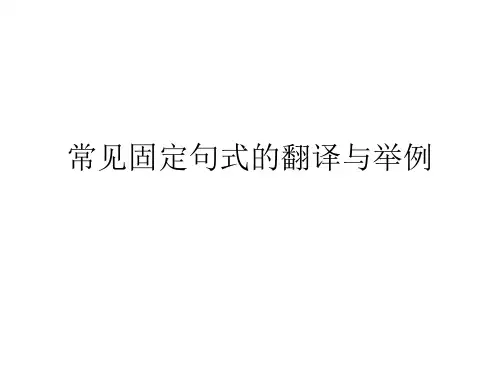
Lecture 7I.Inverted translation (换序译法)左右right and left 高矮short and tall 文艺art and literature 贫富rich and poor手疾眼快quick of eye and deft of hand 软硬hard and soft1. 他认真热情,一字不漏地记下了所说的话。
(谓语&状语进行调整)Conscientious and eager, he put down what was said, careful not to miss a word.2. 他们乐观、能干、热情,总是想方设法使你一路上顺利舒适。
Optimistic, able and hospitable/warm-hearted, they always try every possible means to make your journey smooth and comfortable.3. 从他们走上祖国土地的时刻起,他们就受到同胞们热情接待。
(从…起—定语从句)Since/from the moment they set foot on their motherland, they will warmly received by their compatriots.4. 她,一个瘦弱多病的女孩子,以她坚强的毅力写出了一部部催人奋进的小说。
A thin and weak girl susceptible/vulnerable to diseases, she wrote one aspiring novel after another with strong will.5. 我们为顾全大局在第三方的调停下开诚布公地多次强烈要求贵方赔偿我们的一切损失。
(在…下:外围结构—独立结构;为的是…:目的—不定式) with the third party acting as an intermediary, to take the interests of the whole into account, we strongly demanded with frankness and sincerity many times that you should compensate allour losses.6. 环境好,图书设备充足,有良师益友指导启发,当然有很大的帮助,但是具备了这些条件,也不一定能保证一个人在学问上就有成就。
汉语疑难句法翻译1. Don’t tell him home truths.不要对他讲逆耳的事实。
【解释】home truth:令人不愉快的事实2. He has a yellow streak in him.他有胆小的气质。
【解释】a yellow streak.生性怯懦3. I know he meant business.我知道他不是开玩笑的。
【解释】口语用法的mean business=be serious; be earnest4. I could do with more leisure time.要再多一些闲暇时间就好了。
【解释】can do=be satisfied with; be content with,满足,忍受,在can 的过去式could 时,便有:“要能得到就好了,”“想要”的意思。
不过常处于戏言。
That man can do with a shave.(那人要把胡子刮了就好了)5. She is now in a delicate condition.她现在是在怀孕中。
【解释】A delicate condition(委婉语):怀孕。
A delicate situation:微妙的局势6. The gray mare is the better horse.牝(pin)鸡司晨7. Keep your chin up不要失去勇气【解释】keep one's `chin up (infml 口) remain cheerful in difficult circumstances 在困难环境下仍然乐观; 毫不气馁.8. There is no living in the island.那岛不能居住。
【解释】there is no +动名词=we can not +动名词—it is impossible to do sth9. It was no that he had plenty of money.那并不是因为他有很多钱。
汉语疑难句法翻译
1. Don’t tell him home truths.
不要对他讲逆耳的事实。
【解释】
home truth:令人不愉快的事实
2. He has a yellow streak in him.
他有胆小的气质。
【解释】a yellow streak.生性怯懦
3. I know he meant business.
我知道他不是开玩笑的。
【解释】口语用法的mean business=be serious; be earnest
4. I could do with more leisure time.
要再多一些闲暇时间就好了。
【解释】can do=be satisfied with; be content with,满足,忍受,在can 的过去式could 时,便有:“要能得到就好了,”“想要”的意思。
不过常处于戏言。
That man can do with a shave.(那人要把胡子刮了就好了)
5. She is now in a delicate condition.
她现在是在怀孕中。
【解释】A delicate condition(委婉语):怀孕。
A delicate situation:微妙的局势
6. The gray mare is the better horse.
牝(pin)鸡司晨
7. Keep your chin up
不要失去勇气
【解释】keep one's `chin up (infml 口) remain cheerful in difficult circumstances 在困难环境下仍然乐观; 毫不气馁.
8. There is no living in the island.
那岛不能居住。
【解释】there is no +动名词=we can not +动名词—it is impossible to do sth
9. It was no that he had plenty of money.
那并不是因为他有很多钱。
10. He wanted to go to sea.
他想去当水手。
11. She is careless of her dress.
她不爱惜她的衣服
【解释】careless of ——不重视。
如果说不修边幅就用careless about
12. Those apples are good and ripe
那些苹果是很成熟了的。
【解释】good and ,当作副词用,意为“非常”(very),“完全”(thoroughly)。
同类型的表达法还有:nice and ,rare and 等,如The car was nice and fast=The car was running satisfactorily fast.
13. The smoke betrayed where the dwelling lay.
炊烟起处有人家。
【解释】Betray 在此处指无意中暴漏,显示。
His mistakes betrayed his lack of education. 14. He is brave like anything.
其勇无比。
【解释】like anything 指拿任何东西来比喻都不相称。
引申成“非常”。
15. It is said that his days are numbered.
据说他的死期已经
16. It is a wise man that never make mistakes.
智者千虑必有一失
17. I am in his debt.
我借了他的钱。
【解释】be in one’s debt指“有负于人”,“欠他的债”。
18. He is dead, as I live.
他的的确确是死了。
19. She will you make you a good wife.
她将成为你的好妻子。
20. We found them at table.
我们看见他们在用餐。
21. But for hope, life would be short.
如果没有希望,人生苦短。
22. He is ignorant to a proverb.
他的无知的有名的,
23. The man was generous to a fault.
他过于宽大。
24. He will finish it in no time.
他马上就回把这个做完。
25. They were killed to a man.
他们被杀得片甲不留。
26. The village is on the side of the mountain.
那村庄在山腰。
27. It is the man behind the gun that tells.
胜败不在武器而在于人。
【解释】Tell 指见效。
28. He never calls a spade a spade.
他从来不说真话。
29. The child is father of the man.
成人是由幼儿长大的。
30. That picture flatters her.
那画像比她本人美。
31. I’ll eat my hat if I do.
我决不做
32. He wants for something to read.
他没有东西阅读正感到难过。
33. There is nothing like home.
任何地方都没有家里好。
34. He will do for a teacher.
他适合作个教师。
【解释】Do=suit
35. I am no man’s man.
我不是任何人的下人。
【解释】Man=servant.
36. He was caught red-handed.
他在现行中被捕。
37. There are friends and friends.
朋友有种种不同,有益友,有损友。
38. The boy cried because his schoolfellows called him names. 那孩子哭了,因为他同学骂了他。
39. Somebody will have to break the ice.
总有人得开口说话。
【解释】brake the ice指打破僵局。
40. Go it while you are young.
青春不再,趁早努力。
41. I went an enemy, and returned a friend
我去时为敌人,归时为友。
42. I can make nothing of what he says.
他说的话我一点也不懂得。
43. I have a long letter in hand.
我正在写着一封长信。
44. They made an example of the boy.
他们惩罚这个男孩以儆其余。